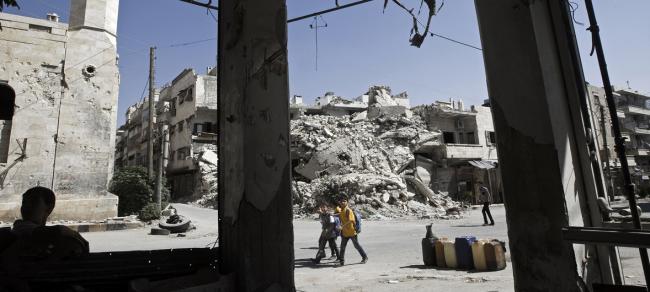
Ending use of chemical weapons in Syria: ‘still work to be done’, says UN disarmament chief
New York, Nov 6 (IBNS): As inspections and investigations continue into several reported instances of chemical weapons use against civilians in Syria, the United Nations High Representative on Disarmament Affairs, Izumi Nakamitsu, told the Security Council on Monday that much remains to be done to end their use, and called for international unity.
In more than seven years of brutal civil conflict, the Organisation for the Prohibition of Chemical Weapons (OPCW) and the UN, through a Joint Investigative Mechanism, found evidence of multiple instances where chemical weapons – including sulfur mustard and sarin – were used by the Syrian Government forces as well as non-state armed groups.
In 2013, the UN Security Council adopted unanimously resolution 2118, which called on Member States to implement a programme to eliminate the use chemical weapons in the Syrian conflict.
The effort, led now by the OPCW, has made some additional headway: the inspection of two facilities is currently underway in Barzah and in Jamrayah; a fact-finding mission was carried out in September in Douma into allegations of use and conclusions are expected to be released shortly; five other incidents of alleged use of chemical weapons in 2017 are also currently being investigated.
However, five years after the Security Council’s resolution was adopted, High Representative Nakamitsu said “there is still work to be done.” She referred for example to “allegations regarding a possible planned use of chemical weapons in Idlib” – the last area of the country under rebel control where millions of civilians are sheltering – which are “continuing to surface”.
“So long as the use of chemical weapons is ongoing, or the threat of their use lingers, we must retain our focus on this issue and not allow ourselves to become inured to it,” she stated.
Stressing that “unity in the UN Security Council is required,” she noted that “the identification and accountability of those responsible is imperative”.
In June, the OPCW Secretariat was given the task by the parties to the Chemical Weapons Convention, to “put in place arrangements to identify the perpetrators of the use of chemical weapons in the Syrian Arab Republic”.
Calling on the Security Council to “re-establish the norm against chemical weapons,” she said that “the use of these weapons must always be seen as a violation of a deeply-held taboo”.
“The vitality and credibility of the broader disarmament and non-proliferation architecture depends upon it”.
Following Ms. Nakamitsu’s briefing, Representative of the United States of America, Jonathan Cohen, expressed support for the UN-led political process to end the war in Syria, and noted that “chemical weapons have no place in our world”.
Disputing the facts as presented by the UN disarmament chief, the Russian Ambassador, Vassily Nebenzia, stated that “chemical stockpiles were withdrawn from Syria under the oversight of the OPCW,” that “the facilities of the former military chemical programme have been destroyed” and that “the inspection measures have become futile”.
UNICEF/UNI150195/Diffidenti
Support Our Journalism
We cannot do without you.. your contribution supports unbiased journalism
IBNS is not driven by any ism- not wokeism, not racism, not skewed secularism, not hyper right-wing or left liberal ideals, nor by any hardline religious beliefs or hyper nationalism. We want to serve you good old objective news, as they are. We do not judge or preach. We let people decide for themselves. We only try to present factual and well-sourced news.







